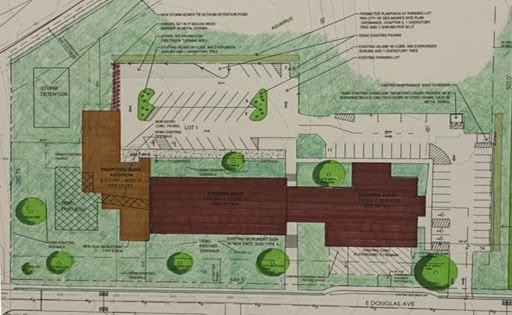‘They could just find a different place to put’ proposed homeless shelter
The Plan and Zoning Commission approved a request to rezone property in northeast Des Moines. The rezoning, if also approved by the City Council, will allow plans for homeless shelter on the site to move forward.

KATHY A. BOLTEN Feb 7, 2020 | 8:17 pm
4 min read time
847 wordsAll Latest News, Real Estate and DevelopmentHope Ministries has made an offer to purchase the former Douglas Elementary School at 3800 E. Douglas Ave. The nonprofit is proposing to raze the 1908 building on the site and build a two-story facility that would serve homeless women and children. The additions built in 1965 would remain. Rendering by Ask Studio. Rendering by Ask Studio.
For more than two hours Thursday, members of a Des Moines city advisory group listened to comments from more than 40 residents, many of whom expressed objections to opening a homeless shelter in the northeast section of the city.
The shelter, proposed on a former elementary school site at 3800 E. Douglas Ave., would lower residential property values, several said. Nearby schools would become more crowded, others said. Too many low-income apartment buildings already exist in the area, a few said. Shelter residents will wander the neighborhood, causing problems, some commented.
A few people said Hope Ministries should find another location for the proposed center that would serve up to 100 homeless women and children.
“We have a mall on the southside of Des Moines that is sitting there empty,” resident Brad Lovell said. “There’s shopping. There’s food. …There’s employment opportunities. There’s buses. But it’s probably expensive and that’s probably why they don’t look at it.
“Everyone in this room probably agrees Hope Ministries does good work. I think they could just find a different place to put” the proposed center.
Not everyone among the more than 100 people who packed Thursday’s Plan and Zoning Commission meeting spoke against the proposed center.
Janice Rouse, whose house is near the site, said she supports having the homeless center at the facility that, until recently, had been occupied by a church.
“We know that the people coming into the Hope shelter are vetted,” Rouse said. “We don’t know that about [the people who live] in our low-income apartments.”
The center won’t evict occupants and set their belongings on the curb “like we see at the apartments,” she said.
Rouse told the board that there’s less chance of the homeless shelter bringing down property values than the area duplexes, many of which are not well kept.
“I would much rather live right next door to a homeless shelter for women and children than I would those duplexes because those duplexes have brought down my property value,” Rouse said.
Hope Ministries representatives answered many of the questions posed by residents. They said children at the center would continue attending schools in which they are enrolled rather than re-enroll schools near the proposed homeless center. A real estate appraiser, in a study of residential sales near homeless shelters, found home values were not affected by the centers.
Leon Negen, president and CEO of Hope Ministries, told the commission that people who violate the center’s rules “are not released after curfew into the night to wander the neighborhood. That does not happen.”
Before potential residents can stay at the center, they work with an adviser to ensure they have a plan of where they would go and how they would get there, Negen said. “Every individual has an exit plan.”
Hope’s current facility for women and children can only serve about 35 people at a time. However, the group gets more than 100 calls a month from women who need a safe place to stay, a spokesperson has said.
The commission, on a 10-1 vote, approved the city staff’s recommendation to approve the request to rezone the 5.49 acres.
Commissioner William Page voted against the recommendation.
“The problem I have with this is the scale,” he said before the vote. “It’s a very large facility. … If Hope decreased some of the beds, decreased some of the amenities, that would be a compromise I think I could vote for.”
The Des Moines City Council will consider the request at a public hearing scheduled for March 9.











